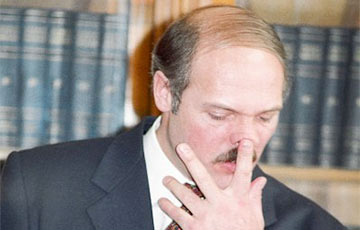"Lukashenka Was A Sorry Sight"
71- 6.07.2018, 8:18
- 222,916

The way the dictator took in our country to Russia.
On July 3 Lukashenka celebrated "Independence Day" - the day when Minsk was released from fascists in 1944. But several week before the holiday the Belarusian ruler mentioned unexpectedly that his country might lose its sovereignty. Demanding his vertical to fulfill economic objectives, he stated: "We are on the front. If we fail as the state in next few years, we will have to become the part of another country or will serve as a door-mat. God help you if the war like that in Ukraine will wage here", Ukrainian "Delovaya Stolitsa" writes.
It's clear that Lukashenka meant Russia saying "another state", no one else lays claim to the Belarusian territory. But this statement is a great reason to recall the story occurred more than 20 years ago, when Lukashenka himself was about join Russia while trying to settle down in the Kremlin.
To Move From Minsk To Moscow
After coming to power in 1994 and consolidation of it in 1996, Lukashenka was serious about settling down in Russia. His victory on elections was ensured by people's desire to "come back to the USSR" and he was ready to play the scenario in Russia.
In 1996-1997 the ruler of Belarus used to spend much time in Russia. Lukashenka traveled about Russian regions and negotiated about "economic cooperation", but, in fact, it was his election campaign. Lukashenka drew a picture of a prosperous Belarus - working plants, preserved collective farms, free health care and education sectors, the life without oligarchs and "overall privatization" - to already impoverished Russians...
At the same time, Lukashenka had a strong political and ideological lobby in Moscow. The ideological lobby was represented by Russian writers-nationalists he used to have close ties with. First of all, they were Stanislav Kunyaev and Alexander Prokhanov who persuaded Lukashenka that he's born to become "in-gatherer of Russian lands" and to turn back the tide of "geopolitical catastrophe" (the collapse of the USSR). The political lobby was represented by Gennady Zyuganov, Gennady Seleznev, Evgeny Primakov and Yury Luzhkov. They made their own plans on the Kremlin throne and wanted to use the Belarusian "upstart" as the tool to change the image of power in Russia. Lukashenka was popular among the military, those discontent with the pro-Western course of Yeltsin and Andrei Kozyrev (Minister of Foreign Affairs in 1990-1996) and those missing the USSR.
That was almost the "scheme" in the Russian capital on how to make Lukashenka the head of Russia and Belarus as an addition. After removing Yeltsin, they planned to resolve their own issues. The situation was proper: NATO made its way eastwards. Evgeny Primakov persistently served the idea of Russia-Belarus union as a counter.
The "Trojan" Treaty
On November 5, 1996 Boris Yeltsin had a cardiac surgery. The treatment lasted for several months, and that period Lukashenka used in his favor. In March of 1997 a special draft treaty on creation of Russia-Belarus Union was created. It implied alternation of position every two years. In Russia the draft treaty was developed by Deputy Prime Minister Valery Serov and his team. They were responsible for integration issues in the Russia's government. In fact, he acted for the benefit of the Belarusian ruler.
Article 18 of the draft treaty implied the establishment of the Supreme Council of the Union. It included presidents of Belarus and Russia, Prime Ministers, speakers of "Parliaments" of both countries, as well as the Chairman of the Executive Committee of the Union. But then Yeltsin lost his power over the Supreme Council. Four Belarusian voices plus the voice of speaker of State Duma Gennady Seleznev (Yeltsin's opponent) ensured Lukashenka's victory in every voting.
The draft Charter of the Russia-Belarus Union was an eddition to the union treaty. For example, it stipulated: "Decisions of the Supreme Council of the Union are mandatory for bodies of the Union and for bodies of the executive branch of states parties." It also stipulated the establishment of the single Parliament elected by citizens of the Union. The number of representatives of both parties should be equal, given the difference in population (Russia - 150 million people, Belarus 9.5 million).
Later daughter of Boris Yeltsin Tatyana Yumasheva described those events on her blog: "In April of 1996 Russia and Belarus signed the treaty on creation of the Community of two countries. It aimed at establishment of closer ties between them. The Executive Committee of the new union was entitled to develop documents".
The key document was the Charter of the Union State. As it usually happens, the document was submitted for discussion to ministries and departments; it got the visa of the Russian Ministry of Foreign Affairs and the Ministry on CIS Affairs. Finally, it reached the government and Deputy Prime Minister Valery Serov initialed the document. Mass media announced the signing of the new union treaty by Boris Yeltsin and Aliaksandr Lukasehnka on April 2. It's objective was the creation of the single federal state with common customs service, currency, citizenship, border and military union.
"In the night of March 28 the First Deputy Minister Anatoly Chubais gives the head of the Administration Valentin Yumashev a call and says: "Do you know that the new state appears in a week?". - What do you mean?, Yumashev wonders. Chubais: - The state where neither the Russian president not the Russian government are needed. The document on the table of Chubais abolishes the sovereignty of Russia and devolves power on new bodies - the Supreme Council and the Parliamentary Assembly. I the morning the president was informed about it. My father spit fire. It was not possible to cancel the visit of the ruler of Belarus. It was not possible to sign the document either.
Moreover, there was a rift in the government and the Administration. Deputy Prime Minister Serov and Assistant to President Ryurikov insisted on signing the document. They reasoned that the Charter was the step towards the new Union, and Kazakhstan, Ukraine, Kyrgyzstan were about to join it, as well as other countries. Russia's sovereignty remains, because it's economically stronger. Opponents wondered what they would do if Lukashenka as the head of the Union and the Supreme Council would run the economy of Russia the way he did in his country or would declare a war to the West. "We will not let him do it" they replied. But the Charter entitled to it, and one could not but allow it.
"As a result, it was decided to amend the Charter and to cross our paragraphs contradicting the Russian Constitution. In order not to go off the deep end, the draft Charter was submitted to the popular discussion. Having understood that it would not be run Russia, the Belarusian party required to cross out the paragraph - a prospect on the creation of the federal state - that affair had been organized for," Tatyana Yumasheva writes on her blog.
Inner circle of Yeltsin carried out a real special operation on the eve of signing the union treaty. Ivan Rybkin, Secretary of the Security Council of Russia, was instructed to change the text of the treaty. Rybkin and Lukashenka burnt a midnight oil and on April 2, 1997 the agreement on creation of the Union State was finally signed; however, it's content drastically differed from the one Minsk wanted to see. Witnesses of the official signing then told "Lukashenka was a sorry sight".
They Came to the Verge
On December 8, 1999 Yeltsin and Lukashenka signed the agreement on creation of the Union State, but it was the Declaration of Intentions. on January 26, 2000 Lukashenka and acting president of Russia Vladimir Putin exchanged ratification certificates on the agreement. It put an end to Lukashenka's attempts to gain a footing in the Kremlin.










